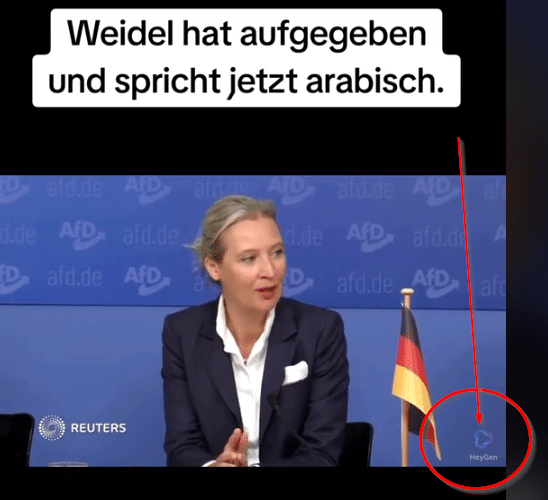The claim
An online video shows Alice Weidel speaking Arabic instead of German.
Our conclusion
The video is artificially edited. It was manipulated with an AI tool to make Alice Weidel, Scholz, Baerbock and other politicians speak in Arabic and other languages.
The spread of AI fakes in political discourse
The Internet is flooded with videos showing politicians in unexpected contexts. One such video suggests that Alice Weidel, the AfD parliamentary group leader, speaks Arabic - a language that does not fit her public profile. But the video is not an isolated case: Donald Trump , Annalena Baerbock , Olaf Scholz and even Erdoğan were made to 'speak' languages such as Arabic, German and Polish that are not their native languages by AI technologies.
What the video shows – and what it doesn’t
The video that shows Weidel speaking Arabic at a press conference is a creation of modern technology. Although it appears that Weidel is actually speaking in another language, the video was edited using an AI tool that matches her lip movements to the Arabic translation.
The source of the manipulation: A TikTok user profile in focus
A TikTok user named “phire167” is behind Alice Weidel’s manipulated video. This specializes in the creation of AI-supported counterfeits. This user has already published a series of videos in which German and international politicians can be seen speaking unusual languages. These include clips of Olaf Scholz, who supposedly speaks Turkish, as well as Recep Tayyip Erdoğan and Donald Trump, who speak German.
At Weidel, the languages vary between French, Turkish, Mandarin and Polish. Despite the obvious fakes, some users continue to spread this content without pointing out the manipulation.
The company behind the technology: HeyGen
Many of the videos shared by the aforementioned TikTok user feature a recognizable logo: “HeyGen.”

HeyGen is a company that specializes in developing artificial intelligence to change the sound and lip movements in videos so that it appears as if the person is speaking a completely different language. This technology highlights the enormous potential of AI, but also poses risks for the spread of disinformation if used irresponsibly.
Artificial intelligence and media manipulation
This example illustrates the possibilities and potential dangers of AI-supported manipulation. The technology known as “deepfake” makes it possible to make people say things in videos that they never said - often in different languages. This can lead to misunderstandings and misinformation.
The context behind the misinformation
The motives for creating and distributing such manipulated videos vary. Sometimes it is political satire, sometimes it is an attempt to spread untruths. In this case, the video was tagged with the hashtag “AI.”
Fact checking and media literacy
The manipulation of videos by AI to make politicians like Weidel and Baerbock speak foreign languages underscores the ambivalence of the technology. Despite its great potential, AI also poses risks for the spread of misinformation.
In order to promote critical understanding, we are hosting a workshop on December 7, 2023 on the topic “Artificial Intelligence: Between Fear and Fascination”, for which you REGISTER HERE !
Conclusion:
The digital world offers many opportunities, but also entails risks. AI-edited videos like Alice Weidel's are a warning example that we should always question media content. Finding the truth often requires a critical look and comparison with reliable sources.
Stay informed: To ensure you are always up to date on the latest developments in the digital space, we recommend subscribing to Mimikama newsletter You can also use our media education offering to strengthen your digital skills.
Also read:
Notes:
1) This content reflects the current state of affairs at the time of publication. The reproduction of individual images, screenshots, embeds or video sequences serves to discuss the topic. 2) Individual contributions were created through the use of machine assistance and were carefully checked by the Mimikama editorial team before publication. ( Reason )

